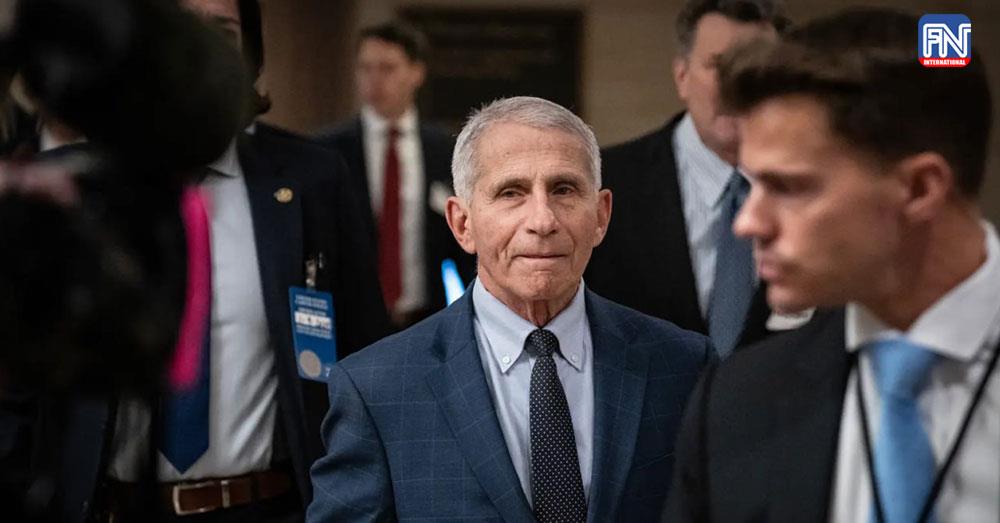WASHINGTON, Jan. 10 (New York Post) - Dr. Anthony Fauci, the former director of the National Institute of Allergy and Infectious Diseases (NIAID) and a top adviser to two US presidents during the COVID-19 pandemic, “surprised” the chairman of a House subcommittee with “how much he doesn’t recall” about the early days of the outbreak that killed more than 1.1 million Americans.
Fauci, 83, had been “very cooperative” on the first day of his two-day transcribed interview with the House Select Subcommittee on the Coronavirus Pandemic, Chairman Brad Wenstrup (R-Ohio) told reporters.
“We’re doing a lot of conversation about developing the process of research, for grants, oversight, if you will, of regulations, and possible solutions for a better path going forward,” Wenstrup said of the interview, which he had teased that morning would cover “more than 200 pages of questions and approximately 100 exhibits.”
Wenstrup had also promised in a statement that panel members will “demand explanations for any pandemic-era failures” and Fauci’s “role as the face of America’s COVID-19 public health response,” predicting that the former NIH official’s testimony “will shed light on topics that no Committee, Member, nor news outlet has ever inquired about before.”
“This is an opportunity for Dr. Fauci to explain his COVID-19 policy positions. His forthcoming, honest, and transparent testimony over the next two days is critical for improving our nation’s future public health responses,” the lawmaker said.
Wenstrup’s subcommittee has focused in particular on efforts by Fauci and former National Institutes of Health (NIH) Director Francis Collins to silence dissent about the so-called “lab-leak theory” of COVID-19’s origins, obtaining internal communications from the top health officials that revealed they had prompted scientists to author a paper in the journal Nature Medicine debunking the theory early in 2020.
The COVID panel also subpoenaed one of Fauci’s top advisers in October for having “likely used his personal email to delete COVID origins documents and evade [Freedom of Information Act] laws.”
Fauci and Collins have both denied in testimony to Congress that the NIH had funded risky gain-of-function research at a lab in Wuhan, China, where the pandemic began in late 2019.
The Government Accountability Office issued a report in June 2023 that found NIH had contributed more than $1.4 million to Chinese research institutions between 2014 and 2019 despite serious biosafety concerns, including at the Wuhan Institute of Virology.
That research “included genetic experiments to combine naturally occurring bat coronaviruses with SARS and MERS viruses, resulting in hybridized (also known as chimeric) coronavirus strains,” the report states, and its funding has since been cut off.
Wenstrup said Monday evening that Fauci had given a “new definition” of “operational” gain-of-function research, a phrase that often describes experiments that make viruses more contagious and virulent.
“I don’t know that every scientist that deals with this type of viral research understands his definition,” the lawmaker said of Fauci
“He needs to define his definition of gain-of-function research, because, as I have, through this process in the last three years, read many, many published articles about gain-of-function research, or creation of a chimera, this is a new one,” Wenstrup added.
“And it varies from what a lot of other scientists use when they report on gain-of-function research.”
Rep. Debbie Dingell (D-Mich.) told reporters that Fauci had referred to his “operational” definition when discussing his high-profile clashes with Sen. Rand Paul (R-Ky.) over the topic in 2021 hearings.
“I think it’s probably pretty political that we’re here to begin with,” she told reporters outside the hearing room, but said the closed-door format would yield “a lot of answers.”
“This format is not playing the cameras, it’s helping us to get the facts and the details,” Dingell said.
The House COVID subcommittee is also probing the influence Fauci had over the US intelligence community about the origin of the pandemic after a whistleblower disclosed that the NIAID director secretly visited CIA headquarters in an attempt to “influence” analysts who later were unable to determine whether SARS-CoV-2 leaked from a lab or was transmitted from animals to humans.
Fauci declined to respond to The Post’s questions about the whistleblower’s claim as he arrived for his interview Monday morning. He also did not stop to talk as he left the interview room just after 7 p.m.
Wenstrup also said he will ask Fauci about misleading information the government gave about natural immunity to the coronavirus, his “flip-flopping position on mask mandates, including for children” and the decision to close down schools and impose business lockdowns during the pandemic.
Additionally, he said, Fauci will be questioned about having accepted royalties and failing to disclose potential conflicts of interest during his nearly four-decade tenure as a public health official.
The former NIAID director, who has said he donates all royalties, was at one point the highest-paid US government official and had a net worth of $11.5 million when he left government service in December 2022.
Rep. Raul Ruiz (D-Calif.), the ranking member on the select subcommittee who has criticized Wenstrup’s approach in previous hearings, did not attend the proceedings.
Rep. Nicole Malliotakis (R-NY), who also sits on the House COVID select subcommittee, told reporters that no one directly asked Fauci about whether the US funded the Wuhan Institute of Virology but she expected Tuesday’s questions to home in on that subject.
“Dr. [Robert] Redfield came to our committee, and he specifically said not only did NIH funding make its way to the Wuhan lab but that [funding from] USAID, Department of State, Department of Defense” did as well, Malliotakis said, referring to the former head of the Centers for Disease Control and Prevention.
“And the question is why? What were they using that money for? Were they conducting gain-of-function research? Did anyone contribute to the development of this virus?”

Photo from Getty Images




